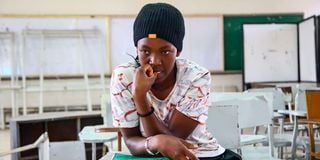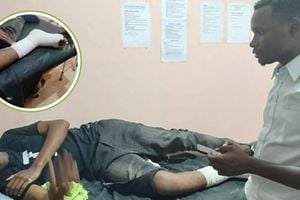
Sarah Awuor Ouma, a Bachelor of Education (Special Needs Education) student at Kenyatta University, during the interview at the university on October 2, 2024.
Sarah Awuor, 18, has barely been at Kenyatta University for two months and she is already fed up, bitter and growing angrier every day at the government for deciding her fate and ignoring her family's reality.
Sitting in an empty lecture hall, Awuor holds her chin in deep thought, the deadline is approaching and the family has nothing to offer but to ask her to go back home.
Her dream of improving her parents' standard of living is what keeps her going and gives her a glimmer of hope that she can overcome the financial hurdles that lie ahead.
"I just want to be successful in life and be able to change my parents' lives because we are four siblings and we live in a slum," Awuor says in a low voice, fighting back tears whenever she mentions her family.
Awuor is from Mathare, one of Nairobi's densely populated slums.
She joined Kenyatta University on August 26 to pursue a bachelor's degree in Special Needs Education, but the deadline to pay tuition fees for her first semester has left her exhausted and struggling to concentrate in class.
Awuor is one of hundreds of students affected by the new university funding model, with most complaining of being put in the wrong clusters.
In her case, she was placed in Band 5, which the government has categorised as a group of high-income households with a potential need for 30 percent scholarship and 30 percent loan.
"We are pleased to inform you that, following your successful application for funding, the Higher Education Fund (HEF) has categorised and placed you in Band 5. This placement means that your household will contribute Sh97,920 per year towards your fees for the Bachelor of Education (Special Needs Education) programme," reads the letter from the Office of the Registrar of Academics.
However, Awuor's family is unable to raise Sh48,960 to allow her to continue with her first semester of studies, leaving her devastated.
"I think I will just drop out because there is no need for me to continue being here and yet there is no fee. The solution is just to drop out," Awuor says, fighting back tears.
Her situation has worsened due to lack of upkeep, and she is about to make a decision that will send her back to Mathare slums and derail her dreams.
Like other students in the same situation, she is forced to skip some meals due to financial constraints and uncertainty about the days ahead.
“This whole thing has affected me so much. I cannot concentrate in class because kuna njaa bwana. Hapa tunainama sana (we are forced to go without food here).”
During the interview, she picked up her phone and dialled her father's number to see if he could beat the deadline, knowing in her mind that as a Jua Kali artisan, it was almost impossible.
“I called my dad and told him to pay first semester fee because the deadline is on October 4. He told me that he did not have enough money to pay for the semester. He asked me to defer my studies for the whole year.”
Awuor's mother is unemployed. The family depends on her father to pay all the bills amidst the high cost of living in the city.
Using sponsorship from Mathare-based Basketball Sports Academy, Awuor went through her secondary school studies at Butere Girls.
Her two siblings, who are in secondary school, are also among hundreds of students from the slums who are benefitting from the academy.
“I was placed in Band 5 and I appealed. I was, however, informed that I have been downgraded to Band 3 but still, it will not work. Band 1 is good for me,” she said.
In her appeal, she attached a letter from the slum’s project manager, Dominic Otieno, who urged the Higher Education Funding to fast-track her case to allow her to settle in her studies.
“Sarah comes from a very poor background and might not be able to continue her studies due to financial constraints. Any assistance therefore shall be highly appreciated,” the letter reads.
The same sentiments are shared by her colleague who has been placed in Band 5, but the process of starting the appeal and supporting documentation has left her parents with no option but to wait for the school's decision.
“I wanted to appeal but my father told me that it is a tedious process which might not bear fruit in the end,” said Michell Oloo, who is pursuing Economics and Finance. She said that her parents are not able to raise her school fees.
Through her friend Meloni, Awuor has received support from well-wishers, which is keeping her going in the hope that her appeal will be successful.
In the placement, students in Band 5 receive scholarship covers of 30 percent, and the 30 percent loan, totalling to 60 percent support, and families contribute 40 percent plus upkeep of Sh40, 000.
Band 4 includes 40 percent scholarship from the government, 30 percent loan and 30 percent contribution from families, and upkeep of Sh45, 000.
Band 3 offers 50 percent facilitation from the government scholarship, 30 percent loan totalling to 80 percent support, and 20 percent contribution from parents and an upkeep loan of Sh50, 000.
Band 2 includes a 60 percent government scholarship, 30 percent loan, and 10 percent contribution from families, and an upkeep loan of Sh55, 000.
In Band 1, the government scholarship covers 70 percent of the total fee with an additional loan of 25 percent, leaving families to cover the remaining 5 percent and students can access upkeep loan of Sh60, 000.












